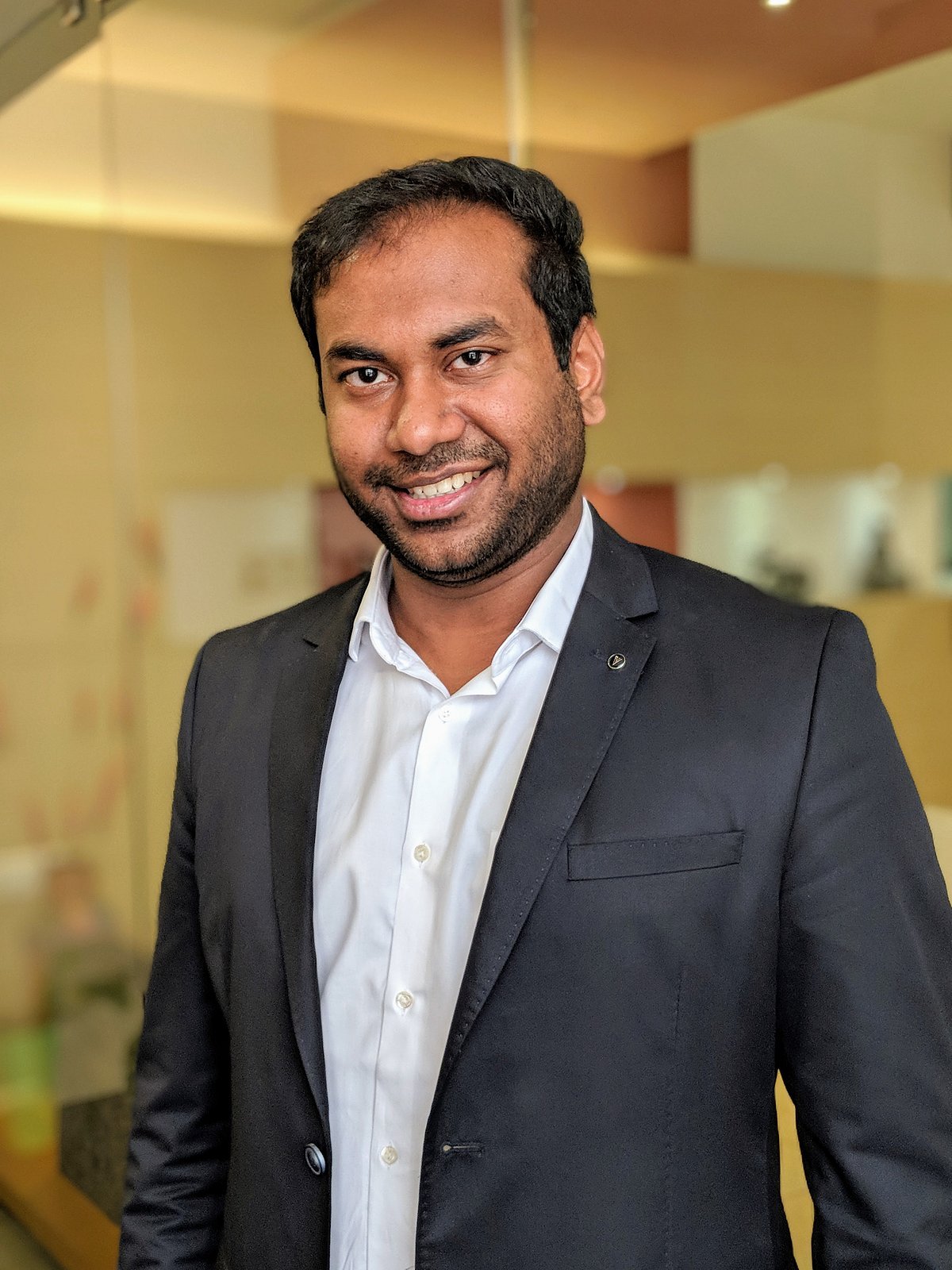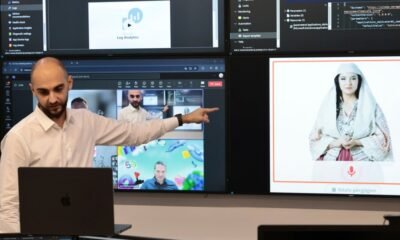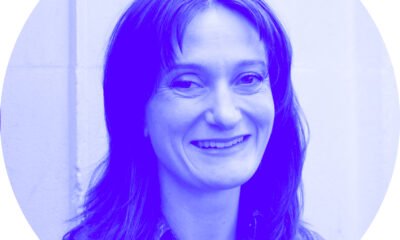Education
High school principal worries new curriculum may privatise education system
Education Minister Erica Stanford
Photo: RNZ / Samuel Rillstone
The government has announced a number of new secondary school subjects and a new emphaisis on artificial intelligence it says will help prepare young people for the jobs of the future.
But one high school principal says the changes means “we could be looking at privatisation”.
Albany Senior High School principal Claire Amos told Checkpoint the changes were a bit of a “mixed bag”.
“I like the breath of the list of subjects, I’ve still got a whole lot of questions around the details of what the subjects entail.
“I’ve got heaps of questions around what the actual curriculum of each of these subjects will actually look like,” she said.
Amos said she was worried that the subject list had only just been released.
She said she did not have any information on course content of those subjects.
Albany Senior High School principal Claire Amos.
Photo: Supplied
There were some “beautiful” subjects, she said, but added she was also concerned the subjects on the list were “narrowed” and “standardised”.
“I’m worried that we are moving towards a prescribed syllabus.
“It bothers me that I think one of the real strengths of our curriculum is aspects of flexibility, and that it can be localised and personalised.
“I recognise that people are concerned about excess flexibility, but i’m a huge believer in the power of NCEA… and think we should be looking at dealing with the problems and issues in NCEA, and solving that and refining it rather than throwing the baby out of the bath water and doing something completely different.”
She said finding teachers for many of the subjects would be a problem.
“We could be looking at privatisation by stealth…
“I would hate to think we are actually disempowering our schools to be teaching our learners,” Amos said.
“My worry is that there have been plenty of signals that actually the whole teaching of these programmes may be farmed out to external providers and that’s really problematic.”
Labour’s education spokesperson Willow-Jean Prime told RNZ the changes had come “really late in the piece” and were a surprise to many in the sector she had spoken to.
“They have been waiting for this list, asking for the list, they haven’t been involved in the development of this list and it has just been dropped and announced and now everybody is trying to figure out exactly what that means for them.”
Consultation on replacing NCEA with a new qualification began last month and ends on 15 September.
Labour’s education spokesperson Willow-Jean Prime
Photo: RNZ
Prime said that meant the sector only had a few days left to give feedback.
“This is the entire scrapping of the qualification framework that we have known for the last few decades and [it’s] being replaced with something entirely new.”
“It was not co-designed with the sector and six short weeks for the sector to provide their feedback is just too short,” she said.
Education Minister Erica Stanford said the announcement of new subjects and the end of the NCEA consultation were not “particularly related”.
“We’re just talking about a very broad high level direction of travel with NCEA… we can make those decisions without knowing the subject lists – they are out now – but there will be many more chances for a lot more decisions along the way around NCEA.
“The broad framework and the subjects are not related. You have to have a curriculum before you have what is being assessed, that is still the case. We will have a curriculum, then we will start to talk about what we assess, and how we assess it,” she said.
Earlier in the day, Stanford said those working on the currriculum changes were investigating having a new Year 13 subject on Generative AI “for later development”.
“With the rapid development of AI, students will also be able to learn about and use generative AI in a range of subjects. This may include learning about how digital systems work, machine learning, cybersecurity, and digital ethics.”
Stanford said the new subjects, being developed for the Years 11 to 13 curriculum, reflect the growing importance of science, technology, engineering and mathematics, often referred to as STEM.
She said the government was introducing new industry-led subjects to give students more choice.
These would include, primary industry, health and wellbeing services, outdoor education, automotive engineering, building and construction, infrastructure engineering, mechanical engineering, tourism and hospitality.
“Students will be able to specialise in areas such as earth and space science, statistics and data science, and electronics and mechatronics. There will also be a range of new specialist maths subjects including further maths.
“When our young people leave school, we want doors to open for them whether they’re going to tertiary study, learning a trade, or heading straight into work. These refreshed subjects will provide students with choice, purposeful pathways and opportunities for specialisation that set them up for success,” Stanford said in a statement.
It was vital students had access to “innovative and dynamic subjects” that would help the country’s future, she said.
Other new subjects include: civics, politics and philosophy, Pacific studies, Te Mātai i te Ao Māori and music technology.
Te Marautanga o Aotearoa will be resourced with a first ever detailed curriculum in te reo Māori as well as new subjects including new Tātai Arorangi (Māori traditional systems of Earth and Sky), Te Ao Whakairo (Māori carving) and Te Ao Māori subjects.
Phase-in over three years
The new subjects would be phased in starting with Year 11 students in 2028, then Year 12 students in 2029 and finally Year 13 students in 2030.
That gave the government just a few years to tackle a staffing shortage that principals have described as a crisis.
Stanford was adamant it could be done.
“Of course it is [possible], and I wouldn’t describe it as a crisis at all.” she said.
“We’ve got more students in training [to become teachers] than we’ve had in a very long time. A 28 percent increase in students studying secondary school teacher training.”
Chris Abercrombie
Photo: Supplied
Stanford explained that not all of the subjects would be covered at every school.
“As it exists now, not all schools do every subject,” she said. “They pick the subjects they’re able to offer, and that won’t change.”
But she noted that existing teachers might need to run additional classes.
“Many of these subjects will be taught by teachers already in the system,” she said.
“For example, there’s a new ‘journalism, media and communications’ subject. The teachers who already exist who teach media studies will likely teach that subject.”
Stanford hoped that the increased workload would be balanced by a flow of new teachers.
“It’s a bit of both. They may be doing additional subjects, or we may be having new teachers into the sector. It’s that combination of both, but we’ve got a long runway to get there.”
Post Primary Teachers Association president Chris Abercrombie said the government’s decision to release the list of secondary school subjects before the rest of the curriculum was putting the cart before the horse.
“It means that we have no idea, for example, of the prior learning that these Year 11 to 13 subjects will build on,” he said.
“We also would like to know what kind of support will be provided for the implementation of the new subjects in particular. We know from much experience that major changes succeed or fail depending on how well-resourced and supported the implementation of them is.”
Industry Skills Boards to develop the subjects
The Education Ministry would commission Industry Skills Boards to develop the subjects.
“These pathways will be industry led and tertiary aligned so they meet what is expected in the professional world, making staying at school relevant for every child, no matter what their career pathway. This will enable students to leave school with a secondary and a tertiary qualification. We’re having one integrated system where all subjects, whether ministry-led or industry-led, are equal,” Stanford said.
The peak bodies for teachers of both outdoor education and tourism courses previously told RNZ they feared the government’s overhaul of secondary school qualifications would downgrade them.
Education Outdoors NZ chief executive Fiona McDonald said the Industry Skills Board responsible for outdoor education had yet to be set up and would be poorly positioned to develop a school curriculum for outdoor education.
Sign up for Ngā Pitopito Kōrero, a daily newsletter curated by our editors and delivered straight to your inbox every weekday.
Education
‘It’s going to be a life skill’: educators discuss the impact of AI on university education | Artificial intelligence (AI)

OpenAI CEO Sam Altman recently told a US podcast that if he was graduating today, “I would feel like the luckiest kid in all of history.”
Altman, whose company developed and released ChatGPT in November 2022, believes the transformative power of AI offers unprecedented opportunities for young people.
Yes, there will be job displacement, but “this always happens,” says Altman, “and young people are the best at adapting to this.” New, more exciting jobs will emerge, full of greater possibilities.
For UK sixth-formers and their families looking at universities, trying to make the best possible choices about what to study – and where – in the age of generative AI, Altman’s words may offer some comfort. But in a fast-changing environment, experts say there are steps students can take to ensure they are well placed both to make the most of their university experience and to emerge from their studies qualified for the jobs of the future.
Dr Andrew Rogoyski, of the Institute for People-Centred AI at the University of Surrey, says that in many cases students will already be well versed in AI and ahead of the game. “What’s striking is the pace of change and adoption vastly outstrips the pace of academic institutions to respond. As a general truth, academic institutions are quite slow and considered and thoughtful about things. But actually this has gone from the launch of ChatGPT to ‘Should we ban it?’, to ‘OK, here are some concerns about exams’, to actually recognising it’s going to be a life skill that we have to teach in every course and that we want all our students to have equitable access to.
“So it’s gone from zero to 100 in a very short space of time, and of course, the world of work is changing accordingly as well.”
His advice to prospective students? “Be demanding. Ask the questions. I think there are some careers that are going to be very different … make sure that universities are adapting to that.”
Students who are less familiar with AI should take time to learn about it and use it, whatever their chosen subject. Rogoyski says being able to use AI tools is now equivalent to being able to read and write, and it’s important “to be resourceful, adaptable, to spend time understanding what AI is capable of and what it can and can’t do”.
He says: “It’s something you need to be able to understand no matter what course you do, and think about how it might impact your career. So read around, look at some of the speculation surrounding that.
“Then I’d start thinking about what the university’s responses are and what support there is for integration of AI. Is my course, and is the university as a whole, on the front foot with regards to the use of AI?”
There will be a lot of information online but Rogoyski recommends visiting universities to ask the academics who will be delivering your degree: “What is your strategy? What is your attitude? Am I going to get a degree that’s worth having, that will stand the test of time?”
Dan Hawes, co-founder of specialist recruitment consultancy the Graduate Recruitment Bureau, is optimistic about the future for UK graduates and says the current slowdown in the jobs market is more to do with the economy than AI. “It’s still very hard to predict what jobs there will be in three to four years, but we think it’s going to put a premium on graduates,” he says. “They are the generation growing up with AI and employers are probably very interested in getting this new breed of talent into their organisations.
“So for parents and sixth-formers deciding where to study, the first thing always to take note of is the employability of the graduates that are produced by certain universities.”
For example, maths has consistently been the top degree his clients are looking for, and he thinks this is unlikely to change. “AI is not going to devalue the skills and knowledge you get from doing a maths degree,” he says.
He agrees that AI is a concern for parents and those considering going to university, “but in the long term I think it’s going to be a good thing. It’s going to make people’s jobs more interesting, redesign their roles, create new jobs.”
Elena Simperl, professor of computer science at King’s College London, where she co-directs the King’s Institute for Artificial Intelligence, advises students to look at the AI content right across a university, in all departments. “It is changing how we do things. It’s not just changing how we write emails and how we read documents and how we look for information,” she says.
Students might wish to consider how they can set themselves up for a job working in AI. “DeepMind is proposing AI co-scientists, so entire automatic AI labs, to do research. So a university should train their students so that they can make the most out of these technologies,” she says. “It doesn’t really matter what they want to study at the university. They don’t have to study AI themselves, but they should go to a university where there is a broad expertise in AI, not just in a computer science department.”
Prof Simperl says that the evidence so far suggests it is unlikely that entire jobs will completely disappear. “So we need to stop thinking about what jobs will be killed by AI and think about what tasks can AI help with. People who are able to use AI more will be at an advantage.”
In the brave new world of AI, will it still be worth doing a degree like English literature or history? “Yes, if they’re well taught,” says Rogoyski. “They should be teaching you things that will last throughout your lifetime. The appreciation of literature, learning how to write well, learning how to think and how to communicate are enduring skills.
“The way that you might use that degree in the future will undoubtedly change, but if it’s taught well, the lessons learned will see you through. If nothing else you’ll enjoy your downtime as our AI overlords take over all the work and we’ll have more time to read books while we’re all on universal basic income.”
Education
Ram Chella – Colleges Of The Future: AI Transforming Education And Employability

Q. How do you see the shift in approach in higher education with AI becoming an integral part of the workspace and learning?
Education in India is standing at an inflection point. For decades, colleges have measured success by degrees awarded, not by the employability of their graduates. But in the age of artificial intelligence (AI), that equation is being rewritten.
The next generation of top 100 colleges to watch will not be the ones that fear AI. They will be the ones that integrate AI elegantly into their workflow—enhancing learning, improving knowledge retention, and producing students with ‘Proof of Readiness’ rather than just certificates.
Traditional classrooms focus on theory. Employers, however, demand proof. The new model of education flips the script: students are trained and assessed in AI-powered practice environments that validate not just what they know, but how ready they are to perform.
From ‘Degrees to Data-Backed Readiness,’ this shift has far-reaching impact. For students it means higher retention, greater confidence, and stronger employability; for colleges it is a decisive move from degree-centric to outcome-centric reputations; for India it is the ability to uplift 100 million learners at scale, fueling national competitiveness.
Q. Could you share a few examples as ‘a case in point’ that are becoming ‘Colleges of the Future’?
Across India, pioneering initiatives are breaking away from the monotone of certificates and resumes. They are proving that employability in the AI era means readiness, not paperwork:
-
AICTE (All India Council for Technical Education) is redefining how education meets industry. Instead of only accrediting degrees, AICTE is actively integrating AI to match students with industry needs—focusing on skills, outcomes, and readiness rather than just certificates.
-
SWAYAM Plus is shifting from being a digital catalogue of courses to becoming an AI-enabled readiness platform, where learners don’t just “complete” modules but demonstrate skills mapped to real employer demand.
-
Apna Jobs has already powered 7 lakh+ interviews through AI-driven skill-matching, eliminating the inefficiency of resumes. By using AI to perform the “non-scalable” tasks—connecting people with the right opportunities at scale—Apna is showing how technology can redefine placements.
These aren’t just incremental improvements. They represent a systemic break from the past—moving India’s education ecosystem from certificates and resumes to data-backed readiness and employability.
Q. Given the urgency of ‘now,’ why does AI-integrated learning matter beyond campuses?
The push for transformation is not just coming from students or regulators. It is being demanded by employers who are struggling to find talent that is not only qualified on paper but genuinely ready to perform on ‘Day One.’ Hiring managers across IT, BFSI, and manufacturing echo the same frustration: traditional degrees tell them what a student has studied, but not whether that student can actually deliver results.
AI-powered readiness models solve this gap. By validating practice, fluency, and applied skills, they give companies the confidence to hire faster and at scale. It isn’t just good for employers—it’s essential for India’s competitiveness.
Consider the numbers: India produces nearly 1 crore graduates every year, yet industry studies show that less than 30% are considered employable. Closing this gap is not an academic issue; it is an economic emergency. If even 10% more graduates enter the workforce job-ready, the productivity impact could add billions to India’s GDP annually.
This is why the ‘Colleges of the Future’ are not waiting. They are breaking free from the monotone of certificates and resumes, proving that readiness is the new currency of employability.
Q. What is the big picture in your opinion?
The overarching scenario is that it is not about survival. This is about transformation at scale. The future of India’s workforce depends on how boldly higher education institutions embrace AI—not as a threat, but as a partner. In fact, the foundation should start at the school level.
And as we celebrate these Colleges of the Future, we set the stage for a new era where education does not end with a certificate. It ends with readiness for the world of work.
Education
Best UK universities for electrical & electronic engineering – league table

Engineering of electrical and electronic systems, microelectronics, silicon devices and nanotechnology
-

 Business2 weeks ago
Business2 weeks agoThe Guardian view on Trump and the Fed: independence is no substitute for accountability | Editorial
-
Tools & Platforms1 month ago
Building Trust in Military AI Starts with Opening the Black Box – War on the Rocks
-

 Ethics & Policy2 months ago
Ethics & Policy2 months agoSDAIA Supports Saudi Arabia’s Leadership in Shaping Global AI Ethics, Policy, and Research – وكالة الأنباء السعودية
-

 Events & Conferences4 months ago
Events & Conferences4 months agoJourney to 1000 models: Scaling Instagram’s recommendation system
-

 Jobs & Careers2 months ago
Jobs & Careers2 months agoMumbai-based Perplexity Alternative Has 60k+ Users Without Funding
-

 Podcasts & Talks2 months ago
Podcasts & Talks2 months agoHappy 4th of July! 🎆 Made with Veo 3 in Gemini
-

 Education2 months ago
Education2 months agoMacron says UK and France have duty to tackle illegal migration ‘with humanity, solidarity and firmness’ – UK politics live | Politics
-

 Education2 months ago
Education2 months agoVEX Robotics launches AI-powered classroom robotics system
-

 Funding & Business2 months ago
Funding & Business2 months agoKayak and Expedia race to build AI travel agents that turn social posts into itineraries
-

 Podcasts & Talks2 months ago
Podcasts & Talks2 months agoOpenAI 🤝 @teamganassi





















